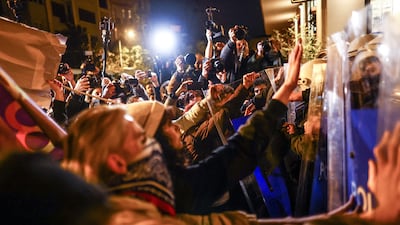Maslawis, as residents of the Iraqi city of Mosul are known, are no strangers to horror. But even in a city that is still recovering from three years of brutality under ISIS rule, the murder last week of a two-month-old girl by her own father was particularly shocking.
The father, who is now in police custody, allegedly strangled his daughter because he was unhappy that his wife had not borne him a son. The same week, elsewhere in Iraq, another father killed his daughter for refusing to marry the man he had chosen for her.
The alarming frequency of such gender-based violent crimes has led to angry demands from activists that Iraq’s government finally pass a draft law on domestic violence that has languished for years in the country’s parliament. “There must be no impunity,” Suhalia Al Assam, a women's rights activist, told The National. “We have been demanding this for over a decade and no action has been taken. Hundreds of women have lost their lives to this issue.”
Violence against girls and women is a problem that is not confined to Iraq. Gender-based violence is a problem from Australia through to Mexico, according to UNFPA that tracks rates of gender-based violence.

A continuum of violence against women and girls, including – but not confined to – threats, harassment, exploitation and even murder – is a universal problem. UN Women says that in 2021 about 45,000 women and girls across the world were killed by their partners or other family members. As shocking as that number is, it does not reflect the true scale of the problem – many incidents of violence and abuse go unreported. There are also variations in how governments and law enforcement agencies record and investigate such crimes – if they do so at all.
A report published by the Wilson Centre’s Middle East Women's Initiative late last year said that there is a lack of “rehabilitation centres to provide women in violent households with safe housing and treatment”. It also claims that many women in the region are “discouraged” from reporting gender-based violence to policemen, who often tell complainants to go home, or even send them back to their abusers.
Gender-based violence is a crime that thrives on silence and it is welcome to see more and more women coming forward, speaking out and fighting to end misogyny in all its forms. Their efforts have helped gain more visibility for a topic that it was once taboo to discuss, let alone tackle.
In December last year, the UAE hosted the launch of the Arab Declaration to End All Forms of Violence against Women and Girls. Speaking at the event was Hessa Buhumaid, who was Minister of Community Development at the time. Now Minister of State, Ms Buhumaid described the elimination of such violence as “a key moral imperative”.
“Women's rights are human rights, and human rights are women’s rights. Violence not only destroys women's lives and divides societies but also undermines development and efforts to build just, safe, and peaceful societies," she added.
It should go without saying that this violence is abhorrent, but it does not spring from nowhere. A tangled web of socio-economic dynamics and a failure to respect women and girls as independent human beings all contribute to the atmosphere of impunity that exists in too many instances where some men are literally allowed to get away with murder.
The problem is a chronic and significant one. Sadly, there is a long way still to go and many hurdles to be overcome but updating national legislation to unequivocally call violence against women what it is – a crime – would be a good first step. Ending the legal, cultural, educational and economic inequalities that often spawn such violence will unfortunately take much longer to achieve.


